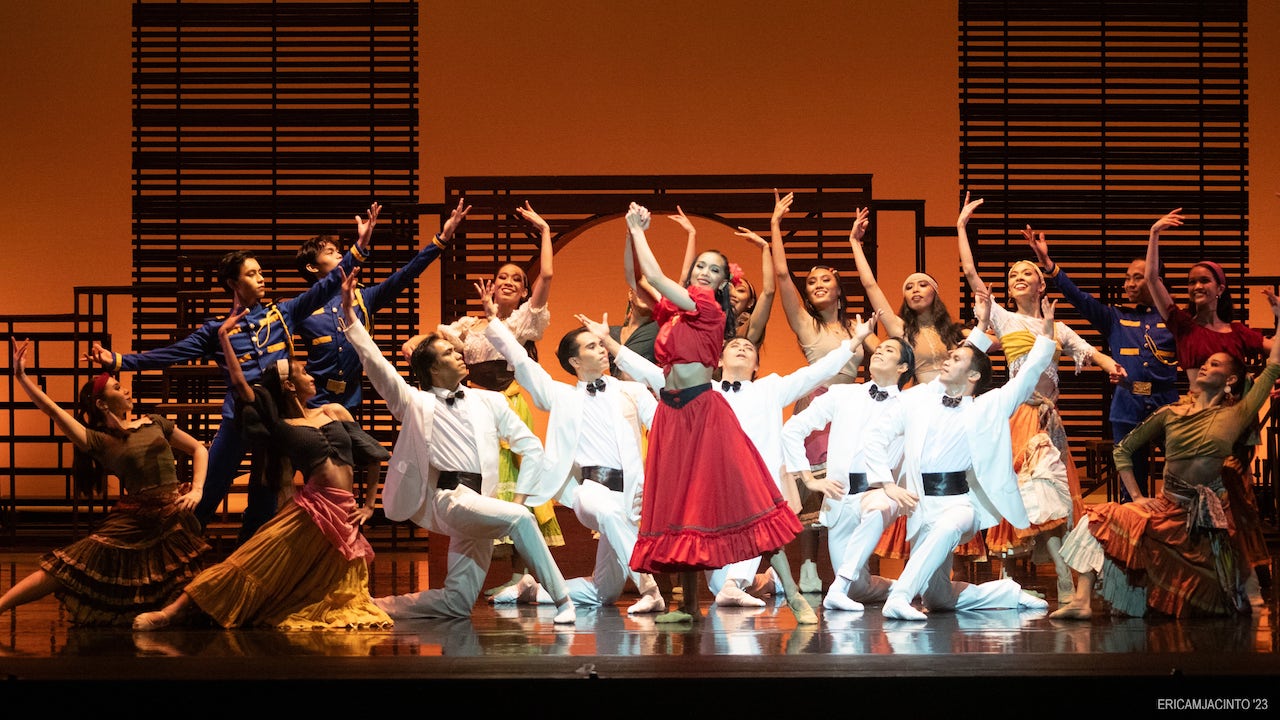
REVIEW: ‘Carmen and Other Spirits’ is a Loud Call to Action
This four-part mixed bill performance offered by Alice Reyes Dance Company Philippines is a loud call to action from different generations. The performance was a curated show featuring three choreographers of different ages highlighting what was (or still is) relevant to them.
The curtains opened to Alden Lugnasin’s “Swimming the Ilog Pasig” which was a social commentary on how indifferent we have become to the glorious Pasig River and the environment that it adequately represents. It was then followed by “Two” choreographed by Ronelson Yadao which was a life commentary about the duality of people. Next was Lester Reguindin’s “Now”, an environmental commentary about climate change. Lastly, Alice Reyes’ “Carmen” is still a social commentary about the strength of the woman.
It may not have been done on purpose, but for this author, it looks like a snapshot of what was important through the decades: eighties, nineties and, now. It’s intellectually filling to see pieces with a lot of depth and history. These kinds of pieces will be seen by the next generations with a different perspective but they will have an idea of how things were during the lifetime of these choreographers in a beautiful way.
Swimming the Ilog Pasig
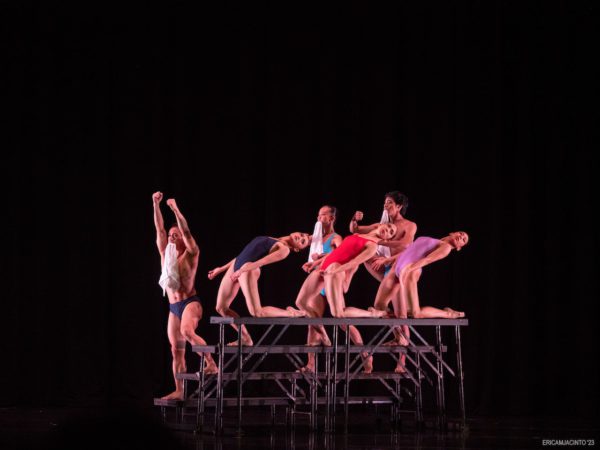
Swimming the Ilog Pasig by Alden Lugnasin; Photo Credit: Erica Feliz Marquez-Jacinto
Alden Lugnasin’s piece “Swimming the Ilog Pasig” premiered in 1989. At that time, highly graphic images of the Ilog Pasig, filled with trash, were widely discussed. When Ballet Philippines II performed it, the piece had a strong impact.
Years after, this restaging performed by ARDP still resonates with the audience even if the Ilog Pasig is no longer front-page news. The piece starts with the innovative use of bleachers that allow the audience to zoom in on the beautiful movement Lugnasin sets on the dancers. Using the aesthetic of synchronized swimming, he exhausted all possible visuals capturing a swim.
Lugnasin’s intricate silhouettes demanded a high level of technique, agility, and body strength from the dancers. The dancers delivered with precision and stoic commitment. In the beginning and towards the end of this piece they scream the word “Hoy!” as if to call out what the people have done. As they scream, they look at absolutely nothing, but this simple word already did its job and triggers the mind to imagine what damage they are referring to. The word encapsulates the disgust for the status quo. I felt it.
Two
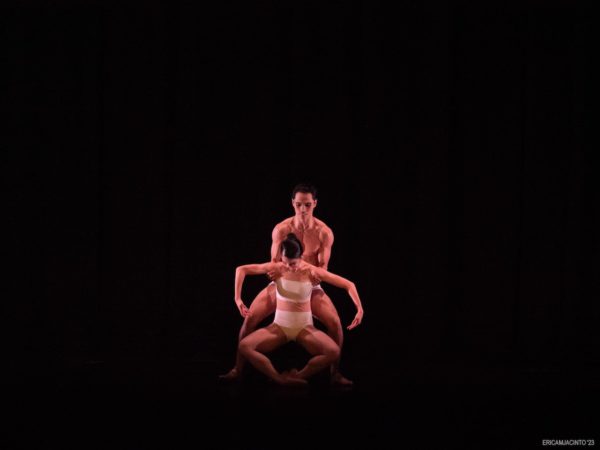
Two by Ronelson Yadao; Photo Credit: Erica Feliz Marquez-Jacinto
“Two” choreographed by Ronelson Yadao is a piece about how people need people. It’s a duet that really is just about energy bouncing off from one to another. Monica Gana and Tim Cabrera showed off their seamless footwork, drops on pointes that transition to the next set of difficult steps.
In this piece, the two dancers hardly let go of each other with each step stitched to the next. “Two” is a showcase piece with a simple message, one cannot live alone. It may not have represented that message strongly, but it did showcase beautiful dancing.
Now
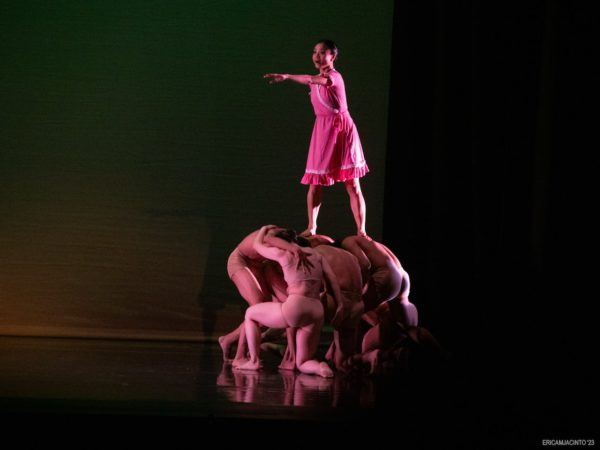
Now by Lester Reguindin; Photo Credit: Erica Feliz Marquez-Jacinto
“NOW” by Lester Reguindin was just so poetic. It is devoid of any frills and delivers a story so pure and so truthful that it will make you feel part of the story. Inspired by Greta Thunberg’s speech on climate change, his piece started with a young girl played by Janine Arisola completely enamored by her perfect world. The dancers were her nature organically moving with her.
Playfully dancing with nature, Arisola showed the innocence of a child appreciating the world’s beautiful gifts. Her momentum is tragically broken by the realization that her world and her future are under attack. Men in suits came in with chairs and her bodies of nature started to wither.
As the music transitions to excerpts of Greta Thunbergs’ speech, the child in Arisola is distraught. In Arisola’s solo, she articulates the words of the speech as if it were her own. The words were expressed so well in movement that the audio almost seemed like she was speaking it. With her small frame, she gave life to every movement given by Reguindin.
She projected her movements with boldness and with so much clarity and passion that she triggered an overflow of emotion much like how Greta’s impact was when she spoke out to the world. There is a picturesque moment in this piece where the men in suits dance as if they were belittling her. They appear larger than life in massive shadows that would scare any child.
But the movement and the words came together. Scared she was not. Verbatim, “How dare you? We will never forgive you. We will be watching you. I deserve better.” And as the men stopped to listen in their chairs and slowly danced in unison with Arisola’s call to action. His art much like Greta Thunberg’s voice cannot be silenced. “NOW” actually stands for NEEDS OF THE WORLD that need attention now. In this staging, Regindin demands your attention.
Carmen
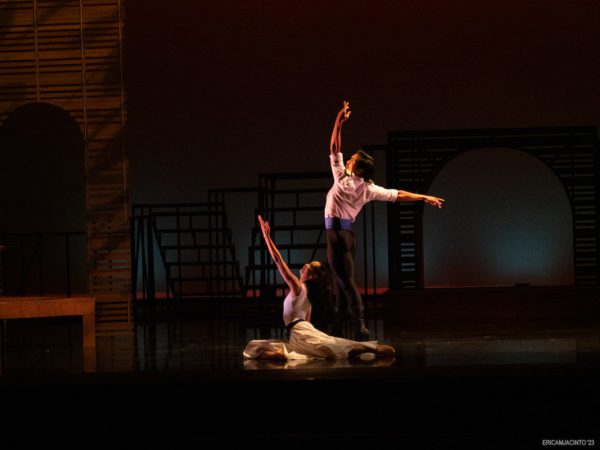
Carmen by Alice Reyes; Photo Credit: Erica Feliz Marquez-Jacinto
Last but not the least is Alice Reyes’ “Carmen”, a fitting ending to this mixed bill. I can only imagine that when “Carmen” premiered in the eighties, it raised eyebrows with its anti-hero theme. Nobody is an angel in this story. Contrary to what is expected, this version is about Don Juan’s narrative, not Carmen’s. It was a tale about a man losing every shred of dignity he had because he loved a woman like Carmen.
In this staging, Carmen was a picture of confidence and freedom. She believed that love was fleeting and lingered indefinitely. She lived for the moment. She knew what she wanted and unapologetically demanded for everything she wanted. In full contrast, Don Juan was weak, compromising, insecure, and temperamental.
Macel Dofitas and Richardson Yadao who took on the lead roles, fully committed to these characters. With their authentic chemistry, nothing was manufactured in their portrayal. Dofitas was like fine wine, full-bodied and rich. With each scene, she became sweeter with her charisma and her movements commanding the stage. Yadao on the other hand was sensitive in his portrayal and put all the attention to his narrative.
While their onstage love story ends tragically in death, their love scenes were swoon-worthy. Reyes cleverly crafted a beautiful pas de deux for Don Juan and Carmen. The choreography was made with nuances that made both an impact on aesthetics and storytelling.
Dofitas with the power of a soft touch would melt Yadao and make him quiver and succumb to a back bend. She would swirl around her hips and he would lift her in the air with her lithe body in the musical climax and she would descend sensually with her body pressed on his.
Particularly memorable would be the partnering combinations that would be executed while the two were locked in a kiss. Technically very difficult to perfect but these two leads did them organically. Carmen in these scenes commanded the relationship and Don Juan overcome with emotions embraced the excitement.
While there was love at the center of their pas de deux, it never was the same amount from both parties. The same attention to detail can be seen throughout the ballet. Reyes seemed to have laced every scene with poetic expressions. This ballet shows depth, a wealth of movement vocabulary, and masterful skill of storytelling. What better proof of this than the touching last scene of Don Juan’s death.
After sharing his story, he walked towards the end of his life. Yadao ascended the stairs shaky with emotion. Embraced by darkness, he looks up at the light and ever so gently hinges while the light dims and covers the stage in total darkness. The sets themselves were also a sight to behold.
Salvador Bernal’s architectural design approach really framed the scenes well. While I loved this ballet over all, there were a few things that bothered me. I love the incorporation of flamenco music by Antonio Olsera and Paco de Lucia in this ballet. However, some of the musical transitions were a bit rough. Mixing music is a challenge because the temperament and texture are not aligned. Also, because the music is recognizably flamenco, the dancing needed a bit more attention to detail for refinement. Flamenco requires specific wrist and finger movements to make it convincing.
Dofitas was generally excellent in her acting but I also would have liked to have different looks of love for each of the men she was involved with. I also would have loved to see this entire ballet on pointe similar to other adaptations. These little details did not significantly take away from performance but they did linger in my thoughts as I was watching the ballet.
Overall, however, in “Carmen”, the message was clear: who runs the world nowadays? Girls.
Tickets: Orchestra Center │ 2,500 Orchestra Side │ 2,000 Loge │ 1,000 Balcony 1 │ 500 Balcony 2 │ 350 Show Dates; October 20, 2023 | 7:30 PM October 21, 2023 | 4:00 PM Venue: Samsung Performing Arts Theatre Running Time: 1 hour 30 minutes (including a 10 minute intermission)
Credits: Choreographers ( Swimming the Ilog Pasig) Alden Lugnasin, (TWO) Ronelson Yadao (Now) Lester Regindin (Carmen) By Alice Reyes Artistic Director : Ronelson Yadao Cast: Swimming the Ilog Pasig John Ababon, Dan Dayo Erl Sorilla, Renzen Arboleda, Sarah Alejandro, Katrene San Miguel, Karla Santos, Michaella Carreon, Krislynn Buri Two Tim Cabrera, Monica Gana Now Soloist: Janine Arisola Ensemble:John Ababon, Dan Dayo Erl Sorilla, Renzen Arboleda, Sarah Alejandro, Katrene San Miguel, Karla Santos, Michaella Carreon, Krislynn Buri,Monica Gana Gianna Hervas, Cehska Vasallo, James Galarpe, Fasutina Francia Alejandro, Cris Jay Malipot, Erica Patoc , Kamille Bautista
Carmen Lead Roles : Carmen Ma. Celina Dofitas Don Jose: Richardson Yadao Prosper Merimee : Erl Sorilla Escamillo : Renzen Arboleda Zuniga: Ejay Arisola Ensemble:John Ababon, Dan Dayo Erl Sorilla, Renzen Arboleda, Sarah Alejandro, Katrene San Miguel, Karla Santos, Michaella Carreon, Krislynn Buri,Monica Gana Gianna Hervas, Cehska Vasallo, James Galarpe, Fasutina Francia Alejandro, Cris Jay Malipot, Erica Patoc , Kamille Bautista , Christian Valerio, Justin Joseph Fraginal, Ricmar Bayonete, Lester Reguindin


Comments